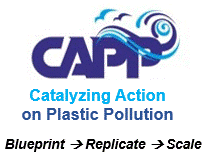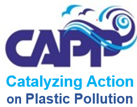‘MAKING THE CASE’ FOR SCALING LOCAL GROUND-LEVEL EFFORTS TO REDUCE PLASTIC WASTE
CAPP presents:
Voices of the
Student Generation
ABOUT PLASTIC WASTE IN EAST ASIA
University and Graduate Student Teams throughout East Asia in the 2022 “Make the Case” student competition were asked the following question as part of their team entry after reading "The Plastic Atlas Asia Edition:
WHAT GRAPHICS (AND FACTS) SURPRISED YOUR TEAM THE MOST ABOUT THE PLASTICS SITUATION IN EAST ASIA AND WHY?
Contributing Student Authors Expanding on What They Learned and What Needs to be done to reduce plastic waste in the world!

Aarti is currently a graduate student at Michigan State University working on a Masters in Packaging Science. She is a 2022 graduate of the SIES Graduate School of Technology in India. Her team won first place in the first "Make the Case India" competition in 2021 championing Kabadiwalla Connect.
by Aarti Desai, recent graduate of SIES Graduate School of Technology
The issue of plastic pollution knows no bounds. Here in India, a nation often characterized by a growing population and a thriving economy, the consequences of plastic pollution resonate with an amplified urgency. A recent report by the Central Pollution Control Board of
India unveils a disquieting truth: India generates a massive 26,000 tones of plastic waste daily ends causing ecological havoc and threatening human health.
Coming from Mumbai, a city of dynamic energy and vibrant diversity, I've been well acquainted with the environmental challenges that we confront. It's with a sense of both concern and pride that I discuss the issue of plastic pollution, delving into the history of Versova beach— a quintessential local destination. Once a pristine stretch of coastline, it had fallen victim to plastic debris, exemplifying our struggle to manage plastic waste responsibly. However, amid this challenge, a heartening transformation unfolded. Local residents united to launch an ambitious cleanup project. Their collective effort succeeded in restoring the beach to its former beauty, offering a potent example of how community-driven initiatives can address plastic pollution.
My journey in understanding the severity of this crisis was deepened by my academic background as a student in Packaging Science. Witnessing the substantial role packaging plays in exacerbating the plastic problem—where it often ends up in landfills instead of being recycled—has compelled me to advocate for more sustainable approaches. It was during my participation in the 'CAPP Make the Case Competition' that I was
exposed to the inspiring work of Kabadiwalla Connect.
Kabadiwalla Connect (KC), a startup we discovered during the competition, demonstrated a unique approach to plastic waste management. By connecting waste collectors and recyclers, this initiative redirects plastic away from landfills. This startup not only mitigates plastic pollution but also empowers local communities to be part of the solution. The founder draws on his experiences across India in leading
local beach cleanup projects.
The competition highlighted the potential of grassroots efforts and innovative solutions in combatting plastic pollution. It underscored the need for collaboration from all sectors of society. Governments, manufacturers, and consumers alike must converge their
efforts to drive transformative change.
A sustainable future relies on adopting a circular economy, where resources are used efficiently, products are designed for reuse, and waste is minimized. Recognizing the urgency of this matter, the battle against plastic pollution requires a united front, where each individual plays a pivotal role in safeguarding our environment for present and future generations. Through initiatives like Kabadiwalla Connect and a steadfast commitment to a circular economy, I believe we can pave the way for a brighter, more sustainable future—one in which the plastic pollution of
the present is a thing of the past.
by Frances Mendoza, current student at University of the Philippines
Plastic pollution is a global issue and yet it manifests most visibly in developing countries like mine, the Philippines. The riversides of developed countries spawned historic civilizations. This should have also been the case for our Pasig river, a river that birthed a nation and is home to rich biodiversity. Disappointingly, the Pasig river has entered the record books as the top plastic emitter into the ocean among all rivers in the world.
Nevertheless, in situations where policies and governance fall short, the resilient spirit of the Filipino people emerges. The world underestimates the eagerness and urgency displayed by ordinary citizens in addressing the global plastic crisis. As a pre-medical student pursuing Biology with a major in Ecology, it is heartening to witness citizen actions and to imagine how these actions might gain wider traction.
Participating in this case competition enabled me to gain a fresh perspective on the plastic crisis, distinct from what is found in textbooks. My groupmates and I researched a wide range of projects in the field. One of my groupmates uncovered a small and emerging company that envisions a circular economy within the delivery sector, aiming to eliminate the use of single-use plastic bags. Juanloop collaborates with blue-collar workers to produce bags, named Juanbags, using recyclable materials. These bags are then returned and reused, effectively reducing plastic waste in the waterways of North Caloocan and maintaining the material within the recycling loop.
While this initiative is promising, especially given the dramatic growth of the delivery sector, it encounters roadblocks in scaling up due to various limitations, including financial constraints. I believe this is not the only initiative initiated by passionate, ordinary individuals that has gone unnoticed and unappreciated. Given the pressing nature of the plastic crisis I really do want to see what would happen if we were to give sufficient time, funds, and attention to initiatives like this -- not only to keep plastic out of the Pasig River, but to empower similar efforts throughout my country, and really the world.

Frances is a Biology student at the University of the Philippines whose interests lie in science communication, climate activism, journalism, and internet studies. They primarily want to work in the climate sector as both a graphic artist and a copywriter having experience working with the Manila Observatory’s OurEnergy2030 project on communicating energy transition in the Philippines. They ambition to pursue a MD-PhD focusing on public health and pollution studies after their undergraduate degree. They also dabble in political theory such as ecofeminism, queer theory, and memory studies.
About
Ocean Recovery Alliance


